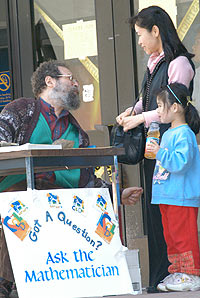Berkeleyan
If it's the Bug Doctor, it must be Cal Day
April 22 campus open house to showcase, as always, the best of Berkeley
![]()
| 13 April 2006
This year's Cal Day, the annual campus open house, will be on Saturday, April 22. Among the dozens of planned programs and events will be expert lectures, artistic performances, games, and exhibitions open to all - including youngsters, teens preparing for college, newly admitted and prospective Cal students and their parents, the senior set, and those eager to see what goes on at the nation's premier public research university.
Events are scheduled from 9 a.m. to 4 p.m. Settings range from the hilltop planetarium at the Lawrence Hall of Science to UC's beautiful Blake Garden, high in the Kensington hills; from the UC Botanical Garden halfway up Strawberry Canyon to the central campus and its surrounding facilities, such as International House and a "green" residence hall.
 Math professor George Bergman has been on duty at this table every Cal Day since 1992. He's back this year. (Peg Skorpinski photo) |
Back this year will be traditional crowd-pleasers such as the "dig" at the Archaeological Research Facility, the three-story-high Tyrannosaurus rex skeleton in the Valley Life Sciences Building, the bug doctor's booth, a children's literature celebration, "Ask a Mathematician," the Cal Band, and (of course) Oski.
New offerings include video games and a series of programs that will follow, by a few days, the 100th anniversary of the 1906 San Francisco earthquake and fire. Campus research will be presented relating to the Bay Area's omnipresent threat of earthquakes.
For the first time, the original fossil bones of a baby Triceratops will be available for viewing, and a multicultural mural lost for 20 years will be on display in the Martin Luther King Jr. Student Union.
Campus experts also will be on hand to discuss black holes and the birth of the universe, climate change, evolution, AIDS in Africa, and California's Proposition 82, a June ballot measure seeking to provide free preschool for all of the state's 4-year-olds.
Several Cal Day programs will share the latest research involving important contemporary health issues. For example, anthropologist Sabrina Agarwal will lecture on osteoporosis, and Irina Conboy, an assistant professor of bioengineering, will talk about understanding - and reversing - stem-cell aging. Lisa Pruitt, an associate professor of mechanical engineering, will present "Body by Design," a hands-on exhibit looking at design issues related to replacement devices for hips, knees, and shoulders that displays materials used in artificial joints and prosthetic devices. "Preventing Type II Diabetes," a disease whose incidence has gone up in every age group in the United States over the last 5 to 10 years, will be the focus of two talks by Sharon Fleming, a professor of nutritional sciences and toxicology.
Entertainment events will include a performance of scenes from Shakespeare's As You Like It, a showcase of works by Berkeley dance faculty and others, African drumming, student poetry readings, Panamanian folk dances, chamber music, and carillon recitals on the hour, starting at 11 a.m.
One Cal Day staple is the walking or cable-car tour of campus. This year, separate tours will branch out to explore the campus tree trail, the Jepson Herbarium, the architecture computing lab, various libraries, the UC Botanical Garden, earthquake retrofit sites, and dozens of campus bear sculptures.
Visitors also can attend a spring football scrimmage and intercollegiate competitions, along with exhibitions of a concrete canoe, robotic racing cars, and a student-designed and -manufactured super-mileage vehicle.
Campus parking is free in designated areas, but the event typically draws approximately 35,000 people - a crowd that puts a major crunch on limited parking. Public transportation is the best way to get to Cal Day. AC Transit and BART go to or near campus, and free shuttles and cable cars provide closer access to a number of campus venues.
A detailed schedule of events is available online at www.berkeley.edu/calday.

